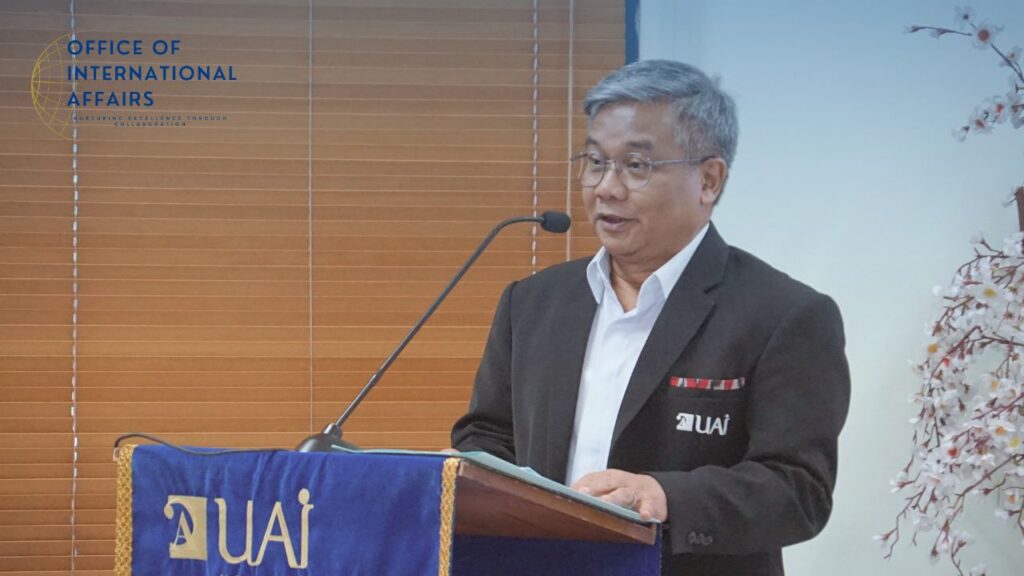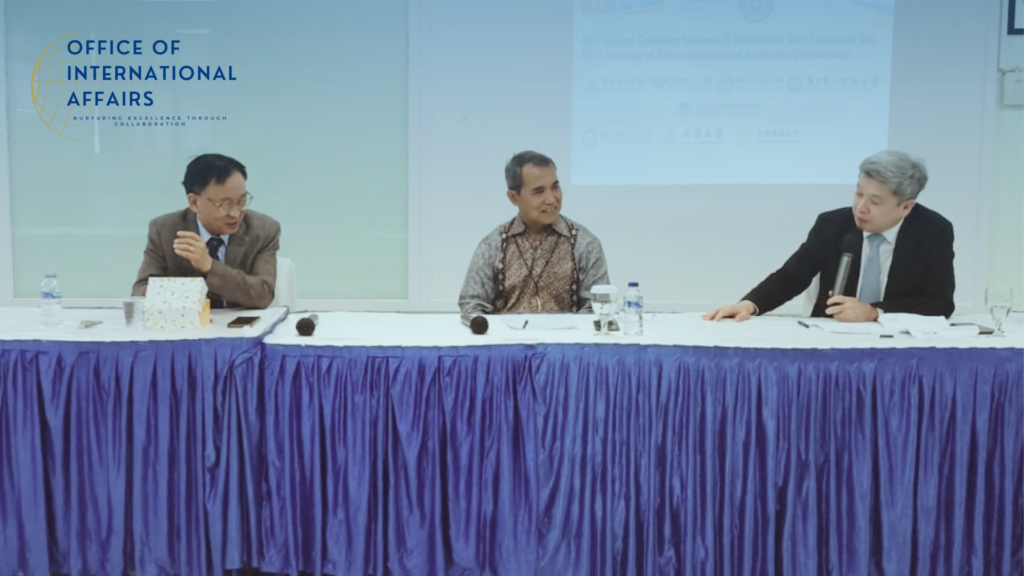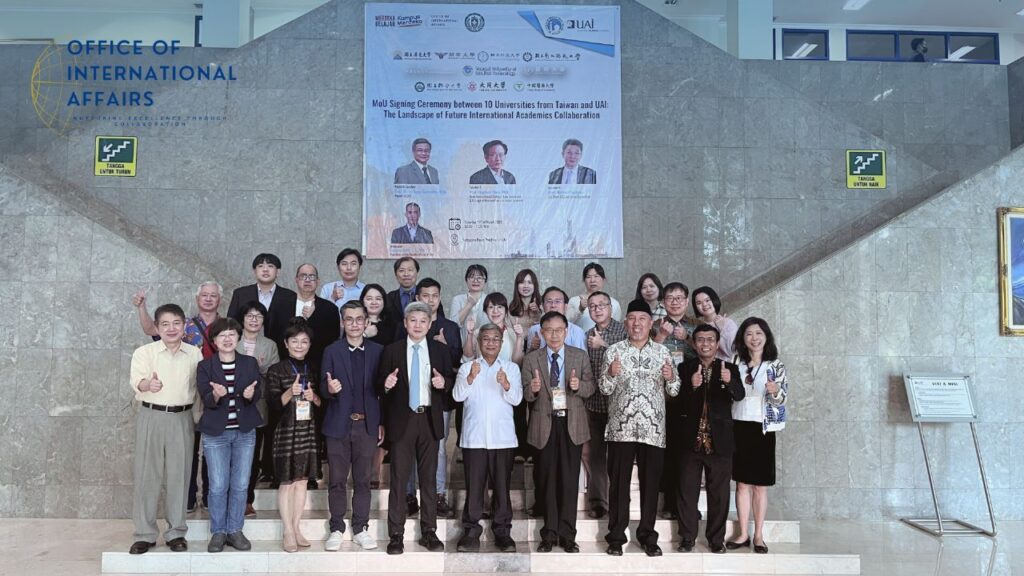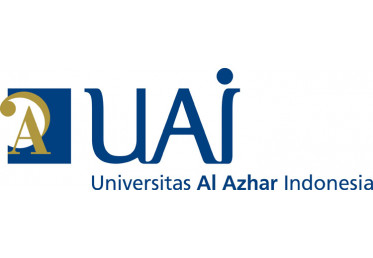University Al-Azhar Indonesia (UAI) has formed close-knit alliance with Taiwan Universities since 2009. One of the fruitful programs is the Virtual Exchanged and Onsite Programs between Asia University Taiwan and UAI. It currently has produced more than 130 students to participate. Manifesting to keep improving, UAI has aspired to advance its internalization in collaborating and advancing its quality of education. Sharing the similar mission and vision, Chang Gung University, National Pingtung University, Kainan University, National Changhua University of Education, Yuanpei University of Medical Technology, Fooyin University, National United University, Tatung University, and China Medical University have agreed to have initial collaboration by signing 10 Memorandum of Understanding (MoU) with UAI through a seminar, “The Landscape of Future International Academics Collaboration” on Saturday (18/3) in Serbaguna Room, 2nd floor of UAI.
In the prologue, Prof. Dr. Ir. Asep Saefuddin, M.Sc., expressed his gratitude to AU and nine Universities from Taiwan for spending their time to visit UAI especially, Prof. Yinghuei Chen, PhD. (Dean International College, Asia University & College of Humanities and Social Sciences). The academics’ system of University Al-Azhar Indonesia (UAI) has launched the blended learning program long before the pandemic hit the world. This is a living-proof that it has seen and predicted the future. Technology will lead its power to academics. Moreover, UAI and Asia University Taiwan (AU) have collaborated in the Virtual Exchange Program. Both have conducted transfer credit on more than two occasions, the Virtual Exchange Program for Fall Semester 2020, Summer Semester 2021, Spring Semester 2022, and Spring 2023. In total, there are more than hundreds of UAI students who have already participated in the program. The transfer credit between UAI and AUT is a result of respective universities’ profound ties towards the future of their International Academics Collaboration. He added during the opening remarks.

“Indonesia has the Freedom to Learn Program, Merdeka Belajar Kampus Merdeka (MBKM), every student has the chance to study for a semester across the globe. By having this MoU, I believe the chance for them to study in Taiwan is getting higher.” (Prof. Asep.
The nine universities thanked UAI and they are very grateful for having UAI as partners. All of them have exchanged students’ programs and they really encourage Indonesian students to come to study in Taiwan. They have a variety of programs in Science and Technology, Education, Business and Management, and so many more. They are also open for advance collaborations which include joint research, seminar, and teaching. They believed that it will be a valuable asset to reach the sustainable goals of development. Last but not least, all of the universities are integrated with the latest technology from Taiwan, therefore studying in Taiwan will feel like home to Indonesian students.

During the seminar, Akhmad Safik, S.E., M.H., LL.M (Vice Dean of Faculty of Law) as the moderator began by reading both the speaker’s profile. Higher Education Indonesia focuses on education, research, and community service. Prof. Chen as the first speaker explained that all the leaders today must act very quick to respond to global change. One of the examples is Prof. Asep has proved that by inviting all the universities from Taiwan to sign the Memorandum of Understanding (MoU) today and we thanked him for thay. This is a new development in how to respond to global change. After this, educators also have missions and it is his belief that one direction to faculty’s collaboration is through joint research, co-teaching, co-hosting conference, coaching-professor between the partner universities. Meanwhile, MBKM is a form of collaboration between the governments of each country which is very impressive. Students can experience the prominent courses that are offered in Taiwan. Taiwan as a place to study also has so many advantageous benefits. Firstly, it has a high quality of education, inexpensive fee (1 year in Japan means 5 years in Taiwan), as a socialist country for any religious belief, culture, and race. Taiwan Universities are working hard to make education is accessible for everyone.
On the occasion, Prof. Michael Goutama (Co-Chair E20 Executive Committee) as the second speaker stated that he highlighted three crucial points about what we can do to landscape the future of international academics’ collaboration. They are destruction, human centered, and roles of education. Education is the key for everything while humans are the issue for anything. Humans keep doing the same thing and expecting different results. Hence, advancing science is a great solution and of the example is through this collaboration. Collaboration is a platform for him as it can be a positive or negative one. This means the thing that can be done is doing small, serious, and real things.

Hopefully, this MoU signing can lead to the implementation which is very significant today, joint research centre about sustainable development goals among these valued universities from Taiwan and UAI.” (Prof. Asep
In conclusion, across the globe, all the Governments, institutions, businesses, and the research sectors are working to grow the nation’s capabilities in science, technology, and innovation. It is very crucial to embrace new solutions that can address the challenges to face the country and the world especially in education. Through the years, education has significantly unprecedented increase in its participation and achievement levels.
Joining the agenda from UAI, Dr. Zirmansyah, M.Pd. (Vice Rector I for Academic Affairs), Ir. Ade Suryanti, M.M. IPU. (Vice Rector II for Resources), Dr. Faisal Hendra, Lc., M.A. (Vice Rector III for Student Affairs and Alumni), Dr. Ir. Ade Jamal (Vice Rector IV for Innovation and Cooperation), Dr. rer. nat. Yunus Effendi, S.Pd., M.Si., M.Sc. (Head of Institute for Research and Community Service), All the Deans and Vice Deans, and all the Head off Program study. (TSH)

